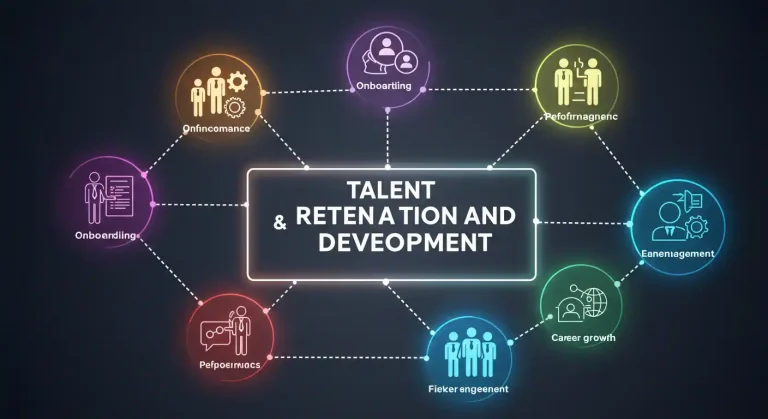Team Management for Business Success
Build High-Performance Teams That Drive Revenue Growth
???? Assess Your Leadership StyleWhy Investing in Your Team Is the Most Profitable Strategy
Team management in your business is one of the greatest challenges but also the biggest opportunity to multiply your productivity and profitability. Your employees are the engine that makes your company run. A motivated, well-led team with a positive workplace culture isn’t just happier—they work better, innovate more, and directly contribute to increasing your bottom line.
At BusinessTop.com, we share practical methods and exclusive tips for team management based on our real experience building and leading small and medium-sized businesses. We show you how to hire, motivate, communicate, manage conflicts, and foster a culture that drives productivity and profitability in your business.
Well-managed teams reduce errors, eliminate rework, and optimize processes. Less time wasted means higher productivity and better profitability for your business.
Motivated and trained employees deliver better quality in products and services, increasing customer satisfaction and your brand reputation.
A positive work environment fosters creativity and new ideas. Your team becomes a source of improvements and growth opportunities.
Well-led teams adapt faster to market changes, new technologies, and challenges, keeping your business competitive and agile.
Engaged employees work more efficiently, generate more sales, reduce operational costs, and directly contribute to business growth.
Impact of Effective Team Management on US Businesses
increase in productivity with engaged teams
lower turnover with effective leadership
higher profitability with positive culture
of employees more engaged with regular feedback
???? Quick Assessment: What’s Your Biggest Leadership Challenge?
Being an effective leader is a journey of continuous improvement. Identify your main challenge right now and get a clear first step to solve it.
???? Your Personalized Result:
????️ Practical Tools for Team Management
Calculators and frameworks to measure your leadership impact and improve team productivity.
???? Employee Turnover Cost Calculator
???? Team Productivity Meter
???? STAR Framework for Effective Feedback
Proven method for giving constructive feedback that actually works:
???? Team Performance Matrix
Evaluate your team based on competence and commitment:
Delegate & Empower
Motivate & Develop
Intensive Coaching
Skill Building
Frequent Feedback
Evaluate Fit
The BusinessTop Method for Your Team
People management is both an art and a science. Our approach is based on practical experience and strategies that work in the real world of small and medium businesses:
- Leadership Based on Real Experience: We share team management methods we’ve applied in small and medium businesses, focusing on the human aspect of leadership.
- From Collaboration to Profitability: We connect every team management strategy with its impact on profitability. A productive team reduces errors and improves quality.
- Comprehensive Talent Management: We cover the entire employee lifecycle: from hiring the right person to motivating and developing their potential.
- AI as a Support Tool: We show you practical examples of how to use Artificial Intelligence to facilitate team task management and improve communication.
- Exclusive Management Tips: We share leadership tips we’ve learned: how to give effective feedback, measure productivity, and use delegation strategically.
Master Every Area of Team Management
Dive deep into each aspect of leadership with our specialized guides. Each area includes proven methods, recommended tools, and real case studies.
Effective Leadership for SMBs
Being a good leader is key to your business productivity. Learn different leadership styles, how to motivate your employees, and improve team communication.
Hiring and Onboarding
The foundation of a great team is choosing the right people. Practical methods for an effective hiring process and tips to integrate new employees quickly.
Productivity and Performance Management
How to measure and improve your team’s productivity? Learn to set clear goals, give constructive feedback, and use task management tools.
Workplace Culture
A positive company culture attracts and retains talent. Learn to foster teamwork, manage conflicts, and create a motivating work environment.
Talent Retention and Development
Investing in your employees is investing in your business. Discover strategies to retain key talent, develop their skills, and motivate them to grow with you.
AI in Team Management
Explore how AI can be a support tool for team management. Practical examples of AI applied to facilitate communication and organize tasks.
???? Team Management Tips From Real Experience
Exclusive tips we’ve learned leading teams in real businesses. Apply these insights to improve your leadership.
???? Feedback That Actually Works
Use the STAR method: Situation, Task, Action, Result. It’s direct, not personal, and focuses on improvement. Always end with “How did you see it?” to generate constructive dialogue.
???? Delegate to Grow
Delegation isn’t just assigning tasks, it’s empowerment. Start by delegating important but not urgent tasks. This gives you room to guide and your employee room to learn.
???? Smart Recognition
Recognize specific effort, not just results. “Thanks for staying late to finish the project” is more powerful than “good job.” Be specific and timely.
???? Productive Meetings
Every meeting should have: clear objective, defined agenda, time limit, and concrete next steps. If it doesn’t meet these criteria, cancel it and use email or messaging.
???? Hire for Attitude
It’s easier to teach a skill than change a bad attitude. Prioritize hiring people with a proactive, collaborative attitude aligned with your business culture.
???? Continuous Development
Dedicate 15 minutes weekly to each employee to talk about their development. Not just tasks, but how they’re growing and what they need to keep improving.
❓ Frequently Asked Questions About Team Management
???? Your Next Step Toward a Productive and Profitable Team
A strong and motivated team is the backbone of a profitable and sustainable business. Investing in your team management capacity and company culture brings invaluable returns in productivity and results.
You have all the tools and knowledge you need to start. Use the calculators, apply the STAR framework for feedback, and begin building the team that will grow your business.








